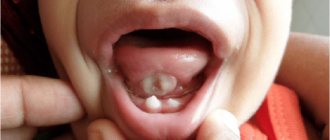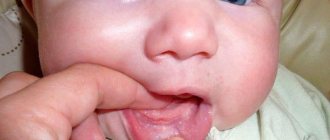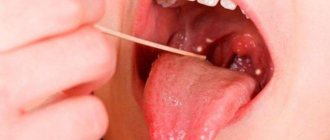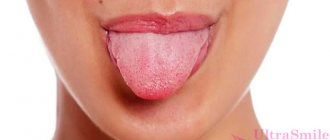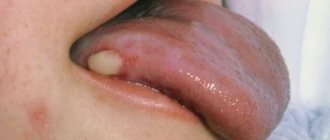We are used to the fact that we need to go to the dentist if we have problems with our teeth or gums. What to do if you have inflammation of the tongue or glossitis? Dentists identify more than 10 types and subtypes of infection. The infection can be caused by both fungus and bacteria. Viral infection is less common. Inflammation can be caused by a lack of certain vitamins and minerals, or hormonal changes. There are many reasons for the disease, so it is important to identify what exactly caused the inflammatory process.
Causes of glossitis
- improper oral hygiene;
- bacterial infection;
- fungal infection;
- heavy metal poisoning;
- bad habits (smoking, alcoholism);
- congenital pathologies of the tongue (folded tongue);
- allergic reaction;
- tongue injury (often caused by malocclusion);
- oral infections;
- lack of iron in the body;
- burn of the mucous membrane (hot food or drinks);
- infectious diseases (AIDS, tuberculosis, scarlet fever, measles).
Herpetic stomatitis in children
There are several types:
- sharp;
- chronic.
This type of damage to the oral mucosa occurs when the herpes virus first enters the human body. Acute stomatitis is typical only for young children. Herpetic stomatitis that occurs repeatedly is called chronic. Herpes stomatitis in an infant appears due to infection of the child by the mother or other people who kiss the baby out of excess of feelings or taste food with the spoon with which he is then fed.
Acute herpes-type stomatitis
The herpes virus enters the baby's body after he reaches the age of six months. At this time, the antibodies the child received from the mother gradually cease to act. In the vast majority of cases (about 90%), the symptoms of stomatitis at such an early age are mild, and only in 10% of children the disease is acute.
Stomatitis in children under one year of age, the treatment of which takes about 2 weeks, is accompanied by weakness in the body, general malaise and muscle pain, which is explained by poisoning of the body. In some cases, the temperature during the first two days of the disease may rise to 40 degrees or higher. The lymph nodes become inflamed, and touching them causes pain to the baby.
A distinctive sign of the disease are small bubbles that appear in groups on the lips, palate, and tongue. The oral mucosa takes on a bright red hue. The bubbles are filled with a clear liquid that gradually becomes cloudy. After about 3 days, the blisters burst, leaving behind erosions covered with a yellow or white fibrinous coating.
Sometimes the gums near the teeth may turn red, so the disease is often confused with gingivitis.
Chronic stomatitis
Once the herpes virus enters the human body, it remains there forever. Symptoms may occur when:
- cold;
- lack of vitamins;
- stressful situations;
- exacerbation of sinusitis, tonsillitis and other chronic diseases;
- injury to the mucous membrane;
- gingivitis or caries;
- habit of breathing through the mouth (lips become dry, causing the skin in the corners of the mouth to crack).
Chronic stomatitis develops in exactly the same way as acute stomatitis, with the exception that the disease does not affect the general condition of the body, because intoxication is minimal.
Herpetic stomatitis in children: how to treat
Types of treatment:
- Use of antiviral agents. Ointments and gels, which are often used to treat herpes on the lip, should not be applied to the oral mucosa. Treatment is possible with suppositories or tablets. The most effective drugs include two drugs. The first of them is “Viferon”, which contains interferons that have an immunostimulating effect. Available in the form of suppositories and gel. There are no age restrictions on the use of the product. The gel should be applied directly to the affected mucous membrane, after drying it with a swab. The treatment period does not exceed one week, provided that the product is regularly applied three times a day. The second is the antiviral drug Acyclovir, which acts on the herpes virus itself, and does not simply increase immunity. The dosage regimen is the same for children over 2 years of age and twice.
- Rinse. It is necessary to use solutions whose action is aimed specifically at suppressing the herpes virus (such popular and cheap remedies as chlorhexidine and various herbal infusions are not suitable). The most effective drug is Miramistin, which should be rinsed three times a day. For greater results, you can apply Viferon a short period of time after rinsing.
- Use of symptomatic remedies. Antipyretic drugs are used when body temperature exceeds 38 degrees. At lower temperatures, such tablets will do more harm, since they will interfere with the formation of natural immunity and the production of interferons.
- Use of immunomodulators. If stomatitis in children, which was treated according to all the rules, makes itself felt again, you can resort to the use of immunomodulators, the most effective of which are:
- “Immunal” is a basic drug that increases immunity.
- “Imudon” stimulates the immunity of the oral mucosa. One course lasts 20 days (you need to take 6 tablets every day). 2 courses per year are recommended.
- Toothpastes with lactoferrin and lysozyme (these substances are contained in special Splat children's toothpastes).
The most common types of glossitis
The most common occurrences in dental practice are:
- acute catarrhal glossitis;
- tongue abscess;
- desquamative glossitis.
Acute catarrhal glossitis is the most common type of inflammation. Inflammation can be caused by microbes or mechanical damage to the tongue. The predominant symptoms are pain, redness and swelling.
A tongue abscess is the appearance of an abscess in the tongue. The abscess can be superficial, under the mucous membrane, or maybe in the thickness of the tongue. Abscesses in the thickness of the tongue, in addition to pain in the tongue, can cause a disturbance in the general condition. A person develops a fever, a headache, and weakness. Most often occurs due to injury to the tongue.
Desquamative glossitis, also known as “geographic tongue,” most often appears in children. It appears in the form of various spots on the tongue, which look like a white coating, alternating with areas of pink mucous membrane. There are no changes other than appearance. Scientists have identified a clear reason for it. The main factors are believed to be bacteria, allergic reactions and hormonal imbalances.
For what reasons may pimples appear on a child’s tongue: associated symptoms and signs
- Geographical language . This is a dystrophic disease, which in medicine is also called “glossitis”. More than 3% of children suffer from this type of pathology. If you look closely, you can actually see a map of the earth on the tongue. The lateral surfaces of the tongue and the back of the inflamed epithelium have a white or red rim, and if neglected, the tip of the tongue may turn red and a small rash may appear. On the affected areas of the tongue where pimples appear, pain, burning, itching and tingling may occur. All these symptoms may appear or disappear on their own. But this is not the main reason for the physiological change in the child’s tongue.
- More than 90% of the population of our planet have been infected at least once with the herpes virus . The crawling virus has the ability to infect any human organ, including the tongue. Even in the mother's belly, infection can occur. On various household items, herpes can retain its properties for up to several days. Therefore, anyone can become infected with herpes, especially children. The main signs of herpes: the formation of pimples in the baby on the tongue, lips and even on the throat.
- Allergy. Allergies can be caused by many things: animals that live with you, foods, medications, household chemicals.
There are many reasons for the appearance of pimples - Stomatitis is another reason for the appearance of pimples and wounds in a child. The stomatitis virus is provoked by several types of pathogenic organisms: herpes, various bacteria, allergies. It may appear due to injury. Often the cause is banal teething in a baby. The patient may complain of burning and itching in the mouth, it is difficult for the baby to eat and talk, and sometimes there may be an increase in temperature.
- Scarlet fever is another reason for the appearance of red bumps on the tongue in a child. This is an acute disease that is very dangerous and infectious in nature. Its main symptoms are: temperature rises, severe headache, tachycardia, the child becomes weak and does not want to eat, intoxication occurs. And the main sign of scarlet fever is considered to be a change in the mucous membrane of the tongue.
- Damage to the oral mucosa, injury from food or liquid, or teeth can also lead to problems with the child’s tongue. All this can be called mechanical injury. Objects are not only dangerous, but also have a lot of germs. And if a child has some kind of wound or ulcer and he puts a dirty toy in his mouth, then the appearance of pimples on the oral mucosa is inevitable. But such wounds heal in a short time and without medical intervention.
Child's tongue - Dysbacteriosis . It appears due to improper diet, antibiotics, and low-quality products. The pimples on the tongue are painless and do not cause discomfort. But still, such rashes need to be treated and always under the supervision of a doctor.
- If there is a lack of vitamins, the tongue may also become covered with spots and red pimples. This is due to a lack of vitamin B, namely B 12 . Changes in the body do not bring any discomfort to the child. With the replenishment of the necessary vitamins, the tongue again acquires its normal color and the rash on the tongue disappears.
Symptoms of glossitis
- increased salivation;
- swelling and redness;
- pain and burning when eating;
- plaque on the tongue in the form of spots;
- bad breath;
- papillomas or warts on the tongue;
- speech disorder;
- foreign body sensation.
Prevention of glossitis - high-quality oral hygiene and no bad habits. It is important to undergo timely preventive examinations and also eat well. All these factors actively contribute to the development of the disease and bring a number of problems.
Preventive measures to help avoid the appearance of pimples on a child’s tongue
To avoid the appearance of such not very pleasant manifestations in a child, you should teach him to follow the following rules:
- Keep your mouth clean.
- Do not chew foreign objects.
- Visit your dentist regularly
- Eat only foods that do not irritate the mucous membranes.
- At the first sign of infection, consult a doctor.
- Strengthen your immune system by consuming the maximum amount of seasonal vegetables and fruits.
- Take the necessary vitamins according to your age
You need to monitor your child's tongue - this is an indicator of the condition of the internal organs.
Make it a habit to monitor the condition of your baby's tongue. Teach him from childhood to monitor his health and adhere to basic hygiene rules.
Treatment of glossitis
A specialist must make an accurate diagnosis and identify the cause of the disease. If you suspect that you have glossitis , and all symptoms indicate this, contact your dental clinic. This is the only way to create the right treatment plan and provide timely assistance. Quite often in such cases, doctors prescribe antibiotics, anti-inflammatory drugs and rinsing the mouth with special antiseptic solutions. In advanced stages, glossitis is treated surgically. Deep abscesses must be opened in the maxillofacial department. Under no circumstances should you take medications without a doctor’s recommendation.
You can cure glossitis, caries or any other diseases of the oral cavity right in your sleep. Family Dentistry Center "Medexpert" provides dental treatment under medicinal sedation. Thanks to this approach, the patient falls into a healthy sleep, ceases to feel pain and discomfort, while the vital functions of the body remain unchanged. Sedation is widely used in pediatric dentistry and even helps fight dental phobia. Dental treatment can be comfortable and painless - tested for yourself.
How to treat childhood stomatitis
Once the diagnosis has been made, treatment for stomatitis should begin as soon as possible. It is necessary to keep in mind that prescribing medications yourself: the decision can only be made by a pediatrician who has information about how this or that medicine can further affect the well-being of a small patient. First of all, the doctor must prescribe a scraping to determine the type of causative agent of the disease, and a virological study: depending on this, the type of treatment is prescribed.
The duration of treatment is influenced by the advanced stage of the disease and the type of stomatitis: on average, it is possible to overcome the disease within a week, provided that the doctor’s recommendations are fully followed.
Children's stomatitis: treatment with medications
Doctors prescribe symptomatic medications, the purpose of which is to get rid of the symptoms that accompany the development of the disease.
Appointed:
- vitamin complexes to strengthen the child’s immunity as a whole;
- antiviral drugs;
- antipyretic drugs;
- gels and ointments for treating the oral cavity.
In addition, it is recommended to drink plenty of fluids and eat a diet that excludes the consumption of spicy, sour and highly salty foods.
The most commonly prescribed drugs for stomatitis are:
- Miramistin. An antifungal solution that prevents wound infection. The drug starts the process of regeneration of damaged tissues.
- Vinilin is an anesthetic with a healing effect. The medicine forms a protective film on the surface of the ulcers, protecting them from irritation when eating food, as a result of which the healing process is accelerated.
- Nystatin is an effective treatment for candidal stomatitis.
- Metrogyl Denta is an antibacterial drug applied twice a day to damaged areas of the mucous membrane.
- Acyclovir is an antiviral drug that prevents new lesions of the rash from appearing. The drug is applied up to 6 times during the day. Thanks to its use, the formation of crusts is accelerated.
Children's stomatitis: treatment with folk remedies
Many parents, in addition to or even instead of medications, prefer to use traditional medicine. As mentioned above, you should not do this without the consent of your doctor, however, you cannot fail to mention these methods of treatment.
So, among these funds it is worth highlighting:
- soda-salt solution. An equal amount of soda and salt are dissolved in a glass of water (about half a teaspoon of each component). It is recommended to rinse your mouth with the resulting solution 4 times a day after meals;
- infusion of chamomile with honey. For the solution, take a glass of boiling water and a tablespoon of chamomile. When the liquid cools, add 2 teaspoons of honey. The product is used for rinsing 3 times a day;
- brilliant green is the most affordable remedy available for sale in any pharmacy. It dries out wounds and prevents new foci of disease from forming.
Course of herpetic sore throat
The diagnosis of herpetic sore throat can be made by an otolaryngologist, therapist or pediatrician after examining the patient and clarifying his complaints. To monitor changes characteristic of a viral infection, the doctor may prescribe a general blood test, and to confirm enteroviral sore throat, a specialist may prescribe a pharyngeal smear and a blood test for specific antibodies. The pathogen can also be detected in stool or inflammatory fluid that is released from vesicles1,4.
Manifestations of herpetic sore throat can go away on their own in less than 10 days. But in any case, at the first symptoms of the disease, you should definitely consult a doctor. You cannot self-medicate2,3.
In some cases, herpetic sore throat can cause complications from the nervous system. In this case, 1 appears:
- severe spasm of the neck muscles, due to which the child cannot bend his head;
- weakness of the muscles of the limbs;
- disturbance of consciousness.
A severe complication of herpetic sore throat is damage to the soft membranes of the brain, brain and spinal cord1,3.
Newborns are at highest risk of developing complications, so they need careful treatment and care3. It is important to maintain hydration and give your child enough fluids1.
Up to contents
